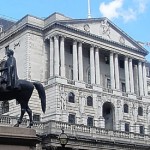Following the Bank of England’s decision to keep interest rates on hold, analysts have forecast that there will not be a rise until the second half of the year at the earliest. The Bank of England decided yesterday to keep interests rates at 0.5% following recent market volatility, with eight of the nine rate setters […]
 Following the Bank of England’s decision to keep interest rates on hold, analysts have forecast that there will not be a rise until the second half of the year at the earliest.
Following the Bank of England’s decision to keep interest rates on hold, analysts have forecast that there will not be a rise until the second half of the year at the earliest.
The Bank of England decided yesterday to keep interests rates at 0.5% following recent market volatility, with eight of the nine rate setters on the Monetary Policy Committee voting for no change. Only Ian McCafferty voted for a rise to 0.75%.
The Bank said: “All members agreed that, given the likely persistence of the headwinds weighing on the economy, when Bank rate does begin to rise, it is expected to do so only gradually and to a level lower than in recent cycles.
“This guidance is an expectation, not a promise. The actual path that Bank Rate will follow over the next few years will depend on the economic circumstances.”
Interest rates have been at a record low of 0.5% since 2009. Despite George Osborne saying last week that that he expects Britain to follow the Federal Reserve’s decision to raise rates, it now appears the chances of this happening in the near future are less likely.
The Monetary Policy Committee noted in its minutes that the outlook for the economy was weaker than previously forecast and that following the 40% decline in dollar oil prices it expects the increase in inflation to be “slightly more gradual” than it predicted in November.
Ian Kernohan, economist at Royal London Asset Management, said: “The recent decline in the oil price will have played a part in the Monetary Policy Committee’s thinking, not so much because they see it as a signal of poor global growth prospects, but because it will keep inflation lower in 2016 than they would have expected a few months ago. On top of this, there have been some signs of weakness in the average earnings figures, which is an indicator on their key watch list.
“Looking ahead, lower sterling should lead to rising import cost inflation, while the bulk of the labour market data is still relatively strong. There will be no interest rate hike ahead of the Brexit referendum however, given the uncertainties which the vote is already creating.”
Investec shifted its forecast for an interest rate rise to 0.75% from the second to the final quarter of the year and also downgraded its forecast of 2% by the end of 2017 to 1.5%.
“The Monetary Policy Committee held back on revealing too many bottom lines on how its thinking is evolving – a more conclusive steer should be revealed at the next inflation report on 4 February,” said Philip Shaw, chief economist at Investec.
He expects rates to remain at 0.5% until after the EU referendum is held.
“At the same time, though unsurprisingly not mentioned in the minutes, we note that the EU referendum vote could be a factor in delaying rate hikes, too. We expect the vote to take place in June or July this year, but September is a possibility. With polls currently neck and neck, the MPC would probably, at the margin, prefer to raise rates after the vote is held,” said Shaw.
Nick Dixon, investment director at Aegon UK, said: “A slowing economy and nervous stock market will have kicked the prospect of any major rate rise into late 2016 at the earliest. Falling oil prices and no inflation across the UK economy are giving the Monetary Policy Committee good reason to keep rates low in order to steady the ship. With the inflation target looking ever distant, we expect the Monetary Policy Committee to remain dovish throughout 2016, with households continuing to benefit from favourable credit conditions.”














